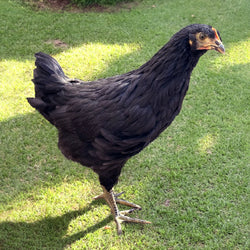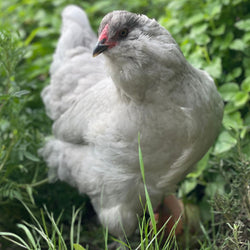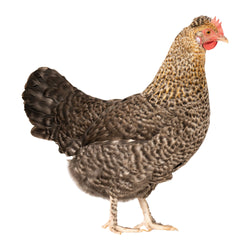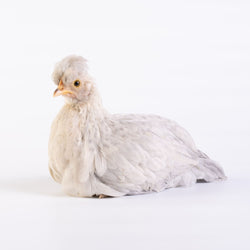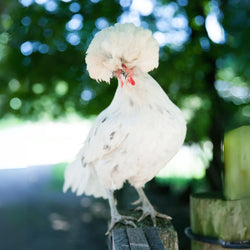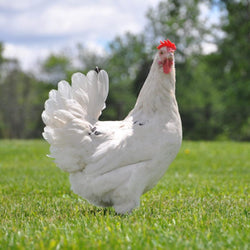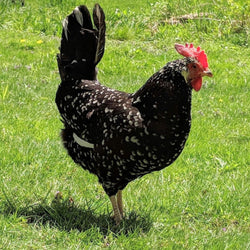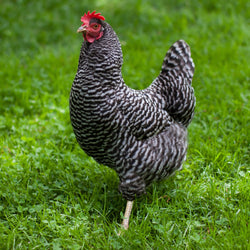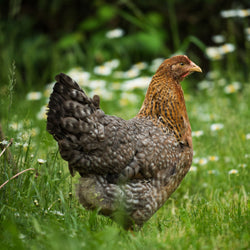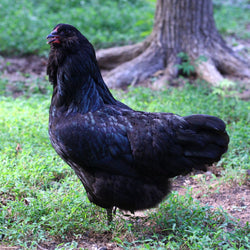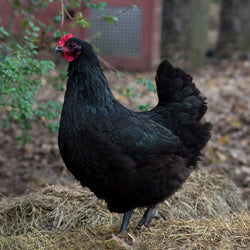page=5/--
Frequently Asked Questions
Here we answer the most commonly-asked questions about ordering, chicken care, and more.
Do you sell chicken eggs that have been in a incubator for a while and will only take a couple days to hatch?
I'm afraid it's not possible to stop incubation, ship the eggs, and then restart incubation afterwards. The chicks would die. It would be akin to a human woman deciding she wanted to take a break from pregnancy for a while to get a nice night's sleep, and asking to have the baby removed for a day or two. Although I think most women would like having the option, especially during the last trimester--I sure would have!--it's just not possible to stop gestation for the fetus--or incubation for the embryo--for a few days without killing it. Make sense? A hen's incubation...
Read MoreWhy do so few hatcheries sell Red Star hatching eggs?
"Red Stars" are hybrid birds; the rooster is one breed while the hen is another. Because of the genetics of the two breeds, the Red Star chicks are "sex linked," meaning that the color of their down when they hatch is linked to whether the bird is male or female. This means that males hatch out a different color from the females, so they are easy to tell apart. Generally you buy Red Star chicks when you want to be assured of getting all females---they aren't vent sexed like other chicks, so vent sexing errors won't occur. Ordering sex linked...
Read MoreWhy do the eggs from one of our hens always smell fishy?
If this is the only symptom you're seeing, she's probably not sick. (If she does show other signs of illness you will want to take her to a licensed avian veterinarian for a firm diagnosis and treatment options.) Interestingly, in some hens that lay brown eggs, eating too much canola or rapeseed meal can cause a fishy smell in the eggs . Not all hens are affected by the process that causes the smell. The smell is caused by the accumulation of trimethylamine (TMA) in the yolk. Most hens metabolize the TMA into another (odorless) compound, but brown egg layers...
Read MoreI want all my eggs to hatch, so is there any type of chicken breed that has a higher hatching rate for their eggs?
This is one of those questions where it's hard to tell what exactly you're asking, a question that tells us you're probably a beginner at incubation. Remember, fertility rates are different than hatching rates. Even when the eggs you place in your incubator are 100% fertile, you may get zero of them to hatch. This is because if the conditions aren't just right---if your incubator is too hot or too cold (or too humid or not humid enough, etc.)---the eggs may not hatch in those sub-optimal conditions. So, hatching rates are dependent on YOU, and how well you or your...
Read MoreHow do I decide between hatching fertile eggs and buying baby chicks?
In almost every case, starting a laying flock with baby chicks will be easier and less expensive than starting one by hatching fertile eggs at home. Don't get us wrong, home hatching is great! But remember that fertile eggs (supplied from any source) are not guaranteed to hatch, because shipping can be so rough on the eggs. With shipped eggs, the average hatch rate is about 50%. That's just the average, though! That means sometimes you will have higher, and sometimes lower. In fact, with eggs, it is possible to do everything right and still not have any hatch. Plus,...
Read MoreWhy do chickens lay different colored eggs?
Well, we can tell you HOW the different colors are made, but as to WHY the different colors are produced, there are just theories. There are guesses, but no one really knows for sure. It's intuitive to think that the colors and patterns of bird eggs should help provide camouflage for the eggs while they're in the nest. However, it's been problematic to show a relationship. For instance, one scientist, Gotmark, painted eggs different colors (brown, white, blue, spotted) and placed them in nests with varying degrees of cover, then kept track of which eggs suffered predation. The color didn't...
Read MoreIs it ever okay to help a chick out of the shell?
Generally speaking you will NOT want to intervene in the hatching process when incubating fertile eggs. If conditions in the incubator are right, it can take 24 hours for a chick to escape the egg after it has pipped, and that's perfectly natural and not a cause for concern. Often it takes much less time, but 24 hours or so is fairly common, too. If it's been more than 24 hours since the chick first pipped and you have had problems maintaining a high enough humidity during incubation, the problem may be simply that the chick is stuck to the...
Read MoreWhat is the nutritional difference between the eggs I can get at a grocery store and eggs my hens lay at home?
Wouldn't it be nice if you could get such good eggs in the grocery store? Until things change, though, most people really can't. Studies show that eggs laid by hens raised on pasture--in other words, hens who have access to a yard or run where they can forage--have less fat and cholesterol, and more healthy vitamin A, vitamin E, beta carotene and omega-3s. A follow-up study confirms the findings, and shows additionally that pastured hens also lay eggs with increased vitamin D--three to six times more! By contrast, eggs you get in the grocery store are typically laid by hens...
Read More







"The Clubhouse" Coop
Easy to assemble and built to last, the Clubhouse Coop is the perfect starter coop for a small flock.
